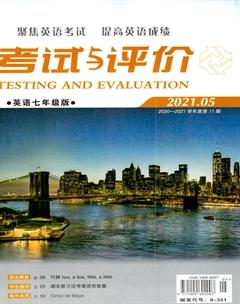Questions & Answers
王玉立 答
【问】 编辑老师,您好!我在学习中遇到这样一个句子:I tried every one of the computers. 在这个句子中,every one是什么意思?这个句子应该怎么翻译?另外,every one与everyone在用法上有什么区别?请您帮我讲解一下,谢谢!
(江苏昆山 杨 怡)
【答】 杨怡同学,你好!很高兴有机会帮助你解答学习中的难题,下面我们一起来解决它吧!
everyone是代词,相当于everybody,意思是“每个人,人人,大家”,作主语时谓语动词用单数形式,与其相对应的物主代词是their或his。如:
Everyone should do their (his) best. 人人都应该尽力而为。
every one的意思是“每个(人、物皆可)”。如:
Every one of us buys many Christmas cards before December 24th each year. 我们每个人每年都在12月24日前买很多圣诞卡。
everyone与every one的區别是everyone只能指人,every one既可以指人也可以指物。everyone后不可以接of,而必须使用every one of结构。如:
Every one of them was drunk. 他们个个都喝醉了。
Every one of the girls received a present. 这些女孩全都得到了礼物。
Everyone thinks they have a right to be here. 每个人都认为有权在这里。
Everyone over eighteen now has a vote. 现在凡十八岁以上的人都有选举权。
How a telephone works is a question which not everyone can answer. 电话是怎样工作的,这个问题并不是每个人都能回答的。
【问】编辑老师,请问“母语”用英语表达有哪些方式?比较常见的有mother tongue;native language,但是,可以像native tongue;mother language这样搭配吗?
(辽宁锦州 于 骄)
【答】母语可以说成native language; mother language; ones first language; ones own language; mother tongue; native tongue; parent language等。如:
English is his mother tongue. 英语是他的母语。
Spanish is her native language / tongue. 西班牙语是她的母语。
She was born in Singapore, but her mother tongue is French. 她生在新加坡,但母语是法语。
Mother languages are special in providing the material with which the world is first voiced, the lens through which it is first understood. 母语的特殊意义在于为我们提供了一种最初用话语表达的工具和认识这个世界的镜子。
【问】编辑老师,您好!请问“She works at a bank.”与“She works in a bank.”这两个句子的意思一样吗?
(广西南宁 凌 悦)
【答】一般要表达某人在某单位工作,用work at和work in都是正确的。区别只在于如果把某单位看作是具有三维空间的建筑物,就用in,如果把该单位看作是具有某种功能的机构就使用at。如:
The boy works part-time at the sports shop. 男孩在体育商店兼职。
She is studying hard at the university. 她念大学时学习很努力。
When we were in primary school together, he was my best friend. 我们一起在小学学习时,他是我最好的朋友。
【问】编辑老师,您好!请您讲解一下“Their friends calls them for work.”这句话中call的用法?
(广东韶关 杜 斌)
【答】 杜斌同学,你好!call的用法是我们初中阶段需要掌握的一个重点项目,它也是各种考试中的常客。现在我们就来了解一下它的基本用法。
(1) call用作名词时,意为“叫声;喊声;号召;拜访”,是可数名词。如:
We heard a call for help. 我们听到了呼救声。
We are ready at all time to answer the Partys call. 我们时刻准备着响应党的号召。
(2) call用作动词时,意为“喊叫;打电话给……”。在你所问的句子中call就是用作动词,句子应翻译为“他们的朋友叫他们工作。”。如:
Call me if I dont wake up in time. 到时我不醒,就叫醒我。
Call me this afternoon. 今天下午给我打电话。
另外,call还有“称呼”的意思。如:
Dont call me Thomas. Call me Tom. 别叫我托马斯,叫我汤姆。
现在我们再来学习几个关于call的常用短语:
(1) call at 意为“访问(地点)”。如:
I had no time to call at Shanghai. 我没有时间访问上海。
(2) call back意为“回电话”。如:
Would you like him to call back? 你要他回电话吗?
(3) call on意为“访问,探望(某人)”。如:
I hope to call on you at your office at 3 this afternoon. 我希望今天下午三点钟在你的办公室拜访你。
【问】 老师,您好!start和begin都有“开始”的意思,它们之间有什么区别吗?
(辽宁大连 林 惠)
【答】在中学阶段我们可以把start和begin看作是同义词,在很多场合可以互换使用。它们的用法也是相同的:begin / start sth. / to do sth. / doing sth.。如:
She begins / starts a new life. 她開始新的生活。
He began / started to cry. 他开始哭了。
At the age of twelve, Edison began / started selling newspapers on the train. 爱迪生在十二岁的时候开始在火车上卖报纸。
但是,start有些词义是begin没有的。如:
We started at five. 我们五点钟出发。(出发)
He decided to start a motor factory. 他决定创办一家汽车厂。(创办)
We couldnt start the car. 我们不能发动这辆汽车。(发动,启动)
【问】老师,您好!请问在这个句子“The test question will be spoken just one time, you must listen very carefully in order to understand what the speaker has said.”中为什么用one time表示“一次”,而不用once呢?
(广东连平 杨 帆)
【答】 用英语表示“一次”,通常用once,表示“两次”通常为twice。如:
Weve met only once. 我们只见过一次面。
Ive been to Beijing once. 我只去过北京一次。
但在美国英语中也可以用one time 表示“一次”,用two times表示“两次”。如:
I have met them only one time. = I have met them only once. 我们只见过一次面。

